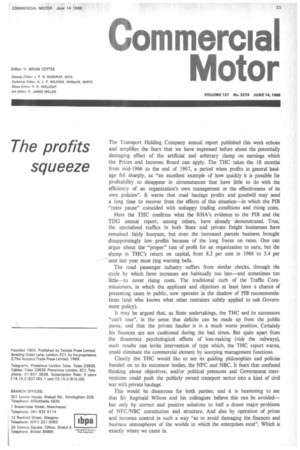The profits squeeze
Page 25

If you've noticed an error in this article please click here to report it so we can fix it.
The Transport Holding Company annual report published this week echoes and amplifies the fears that we have expressed before about the potentially damaging effect of the artificial and arbitrary clamp on earnings which the Prices and Incomes Board can apply. The THC takes the 18 months from mid-1966 to the end of 1967, a period when profits in general hailage fell sharply, as "an excellent example of how quickly it is possible for profitability to disappear in circumstances that have little to do with the efficiency of an organization's own management or the effectiveness of its own policies". It warns that road haulage profits and goodwill may need a long time to recover from the effects of this situation—in which the FIB "rates pause" coincided with unhappy trading conditions and rising costs.
Here the THC confirms what the RHA's evidence to the PIB and the TDG annual report, among others, have already demonstrated. True, the specialized traffics in both State and private freight businesses have remained fairly buoyant, but even the increased parcels business brought disappointingly low profits because of the long freeze on rates. One can argue about the "proper" rate of profit for an organization to earn, but the slump in THC's return on capital, from 8.2 per cent in 1966 to 5.4 per cent last year must ring warning bells.
The road passenger industry suffers from similar checks, through the cycle by which fares increases are habitually too late—and sometimes too little—to cover rising costs. The traditional curb of the Traffic Commissioners, in which the applicant and objectors at least have a chance of presenting cases in public, now operates in the shadow of PIB recommendations (and who knows what other restraints subtly applied to suit Government policy).
It may be argued that, as State undertakings, the THC and its successors "can't lose", in the sense that deficits can be made up from the public purse, and that the private haulier is in a much worse position. Certainly his finances are not cushioned during the bad times. But quite apart from the disastrous psychological effects of loss-making (vide the railways), such results can invite intervention of type which, the THC report warns, could eliminate the commercial element by usurping management functions.
Clearly the THC would like to see its guiding philosophies and policies handed on to its successor bodies, the NFC and NBC. It fears that confused thinking about objectives, and/or political pressures and Government interventions could push the publicly owned transport sector into a kind of civil war with private haulage.
This would be disastrous for both parties; and it is heartening to see that Sir Reginald Wilson and his colleagues believe this can be avoided— but only by correct and positive solutions to half a dozen major problems of NFC/NBC constitution and structure. And also by operation of prices and incomes control in such a way "as to avoid damaging the finances and business atmospheres of the worlds in which the enterprises exist". Which is exactly where we came in.




























































































































